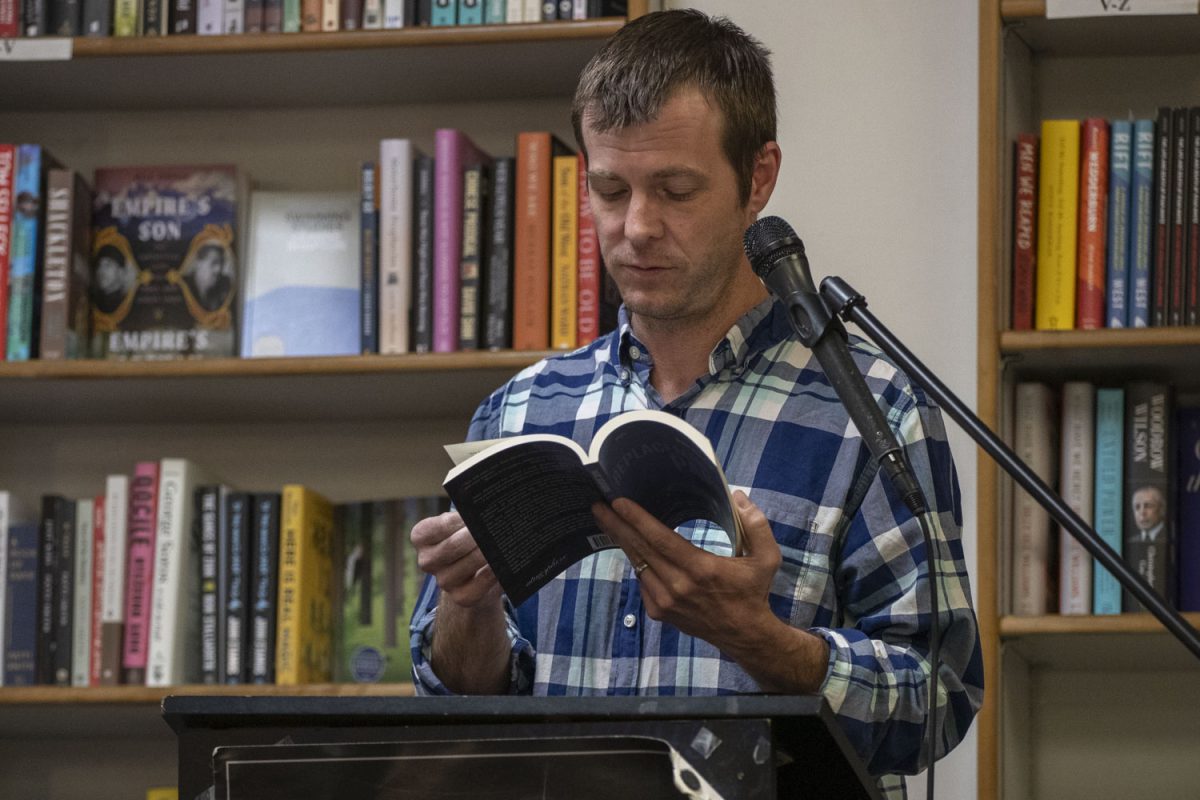Kyle McCord is an alumnus of the Iowa Writers’ Workshop and the Program for Poets and Writers at the University of Massachusetts-Amherst. He has written seven books, one of which was a National Poetry Series finalist, and he is currently the executive editor of Gold Wake Press and acquisitions director for Atmosphere Press. His novel, “Reunion of the Good Weather Suicide Cult,” follows the sole survivor of a suicide cult as he tries to pick up the pieces of his shattered life.
Marc Dickinson is the author of the short story collection “Replacement Parts,” in which grief links the lives of several characters in a small town. He teaches creative writing at Des Moines Area Community College and coordinates the “Celebration of the Literary Arts” series.
McCord and Dickinson read from their books at Prairie Lights on April 1.
The Daily Iowan: Kyle, your book explores a character who is being portrayed by Netflix as a “perpetrator.” What are your thoughts regarding the way true crime media represents “victims” and “perpetrators”?
Kyle McCord: True crime has not become less complicated in the way a person tells the story and the justice that a good documentary tries to do to both sides, but inevitably it’s the case that art always takes a side there. It just inevitably is the case. Netflix is still in the same position as anybody else who is a producer of these things, which is that you are beholden to the creators to have told the most ethical story possible. I think years from now, human beings will look back on this era of engagement with true crime with a little bit of chagrin.
My purpose in writing the book wasn’t to say, ‘Oh, man, these super naughty people are making true crime, look at how unethical they are.’ I wanted to talk about the ethical complexities of this, especially as it touches real people in the real world.
Marc, how did you go about navigating all the individual lives and experiences of grief you intersect in your short story collection?
Marc Dickinson: Each story was written independently, self-contained, and published on its own over several years. After putting the book together, I gave it to my workshop partner, and he was very critical of it. I thought it was ready to go, but he said, ‘A collection could just be like a hodgepodge, but what you’re trying to do is to create a book, not just a collection of things. You notice that this character is pregnant, and then that same character’s pregnant in a different story, and then later on this character is talking about the father that she lost.’ I saw these as intersections, but he told me they were the same characters, I just didn’t know when writing them. It turned into a two-year project where we were just trying to find how all the stories are talking to each other. It was there all along, I just couldn’t see it.
How do your separate works converse with one another?
Dickinson: I think they’re both dealing with grief in different ways. They’re dealing with loss. Kyle’s novel and my stories are thinking about the aftermath of loss. The stories aren’t centered on the tragedy. They’re centered on coping with the tragedy afterwards.
McCord: Marc and I taught together for several years. A lot of our ideas are very structurally similar. We think about character similarly. For all the driving plot features within both stories, it’s fundamentally a story about people. They’re both stories about loss and the efforts to rise above, overcome, or maybe just re-become, in some way, in light of some of the things that happen.
Both of these works take place in rural, small towns. What features of small-town life do you believe facilitate the events of your books?
McCord: One of the great virtues and vices of growing up in a small-town environment is that a person living there has an enclosed environment. Life is enclosed. It’s one of the reasons that a cult often tries to isolate people; small-town life can create bunkers of ideas where it is very easy to be carried away and not have things that challenge it.
Dickinson: I have students who don’t want to write about Iowa because they think it’s ‘boring’ or whatever. There’s a strangeness to the small town, but it’s also like a family. There is a lot of connection, everybody’s in each other’s business, which creates a lot of gossip and rumors. But the town and the people are inextricably linked. In my story, and Kyle’s, too, the town is like a character.



